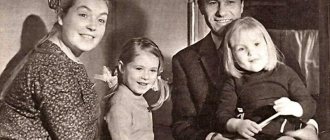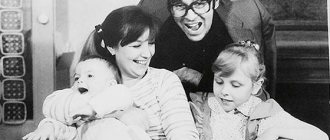Prima and muse of Anatoly Efros, actress Olga Yakovleva is one of the last theatrical legends. It was impossible not to love her fragile heroines. In Soviet times, when actresses embodied the victorious vitality of women, Yakovleva contrasted them with a victorious defenselessness that overwhelmed the stronger half of humanity.
This actress tried to live in harmony with herself, and if she had to sacrifice something for this, she took this step. Then there was retribution, which she steadfastly accepted.
Olga Yakovleva. Biography
Olga was born on March 14, 1941 in Tambovsk. Parents moved from one city to another, as his father was a commercial director at different factories. Olga subsequently believed that her father was thus protecting the family from the “landings” that began from 1937 to 1953. Her mother worked everywhere - as a kindergarten teacher, in archives, and as a telephone operator.
The father was an impulsive, hot-tempered person, and the mother was unusual. She subtly felt everything around her and understood children like no one else. She valued and respected the freedom of her daughters. When the youngest daughter (Olga Yakovleva) climbed a tree pretending to be Tarzan or Chita, her mother did not call her daughter home like all the other women in the yard. She brought a bundle of food to the tree and told Chita to come down and pick up the food. Olga went down and had lunch in a tree, mentally thanking her mother for her sensitivity.
Olga's passion for theater was not welcomed at home. When the time came to choose, seeing her parents’ objections, Olga Yakovleva said that if they persist, she would take a yellow suitcase and go to enroll in a circus school. The argument was strong and the parents gave in.
The girl was admitted to exams at three theater institutes at once: the Shchepkinsky School, the Shchukinsky School and GITIS. I chose Shchukinskoye at random and entered in the third round without passing the fourth. Mom was very upset, believing that it was too early to start an independent life. Classes began in September.
Yakovleva Olga Mikhailovna
Olga Yakovleva was born on March 14, 1941 in the city of Tambov. Her mother was a kindergarten teacher, her father worked at a factory. But soon Mikhail Yakovlev promoted and took the post of commercial director. This position involved frequent travel. Therefore, in her childhood and youth, Olga Yakovleva managed to live in many large cities of the Soviet Union.
Olga’s mother also grew up in her career: she worked as a teacher and, together with her students, staged theatrical productions on the school stage. My mother’s love for the theater was passed on to Olga: she liked going on stage, portraying a variety of characters. Mom noticed this in time and in every possible way encouraged her daughter’s passion for theatrical art.
In middle school, Olga Yakovleva began actively attending classes at various theater studios. No matter what city the family moved to, Olya found a club or studio where she continued to do what she loved. In her senior year, the girl already knew exactly where she would go to study. Of course - to a theater university. But Olga understood that in order to enter she needed to prepare well.
Therefore, after graduating from school, Olga entered the local Theater Studio, which settled at the Alma-Ata Youth Theater. A few years later, the young actress received a diploma with honors and an offer to work in the theater. But Olga Yakovleva’s goal was different - to conquer Moscow.
The young artist, who could no longer be called a beginner, arrived in the capital at the end of 1950. Olga Yakovleva, without much effort, entered the Shchukin Theater School, where she took the course of Oleg Borisov and Joseph Rapoport. Here the actress polished her skills until 1962. After graduating from Shchukinskoe, she was accepted into the troupe of the Lenin Komsomol Theater.
The theatrical biography of Olga Yakovleva began on this stage. But the real flowering of her talent dates back to 1964. It was then, 2 years after the young artist entered the theater, that the legendary director Anatoly Efros came here. He headed Lenkom, becoming the main director. For Yakovleva, like most of her colleagues, Anatoly Vasilyevich was a real deity. The talented actress was also appreciated by the master. He trusted her with roles that required special depth and subtle psychologism. Olga Mikhailovna’s heroines are vulnerable and impulsive. At the same time, they are durable, with a steel inner rod.
Anatoly Efros’s performances “A Movie is Being Made,” “One Hundred and Four Pages about Love,” “Just a Few Words in Honor of Monsieur de Moliere” and “My Poor Marat,” in which Olga Yakovleva got the central roles, were forever included in the Lenkom gold fund.
When in 1967 the question arose about Efros moving to the Theater on Malaya Bronnaya, Olga Yakovleva did not hesitate for a second: she immediately went for her master. Here her growth as an actress continued. In this theater, according to critics, Olga Mikhailovna played her best roles. In the production of “Three Sisters” - Masha, in “Summer and Smoke” - Alma, in “Napoleon the First” - Josephine.
Real events in the theatrical world of the capital were Efros' productions of Romeo and Juliet, Othello, The Brothers Karamazov and Marriage. Olga Yakovleva appeared in the leading roles in all performances.
In 1984, Anatoly Efros was appointed chief director of the Taganka Theater. Olga Yakovleva immediately followed him. Unfortunately, life measured out only 5 years for Anatoly Vasilyevich. Over the years, the actress managed to play only 3 roles under the guidance of a talented director: Nastya in the play “At the Lower Depths”, Bodie in “Beautiful Sunday for a Picnic” and Celimene in “The Misanthrope”.
After the death of Efros in 1989, Olga Yakovleva was unable to work in any theater in Russia. She took the death of the great master very hard. This was connected with her move to France, where she lived for several years.
Olga Mikhailovna returned to her homeland in 1991. At the invitation of Andrei Goncharov, the actress entered the service of the Vladimir Mayakovsky Theater. But as a guest actress she often appeared on other capital stages.
In 2004, Olga Yakovleva moved to the A.P. Chekhov Moscow Art Theater. Here she appeared in the sensational plays “The Cabal of the Holy One,” “Cat and Mouse” and “Spring Fever.”
Olga Yakovleva is 100 percent a theater actress. She has a couple of dozen films in her baggage, but most of them are filmed performances. The only exceptions are a few TV series, among which the most striking are “Mongoose 2”, “Payment for Love” and “House on the Embankment”.
In 2003, Olga Mikhailovna published a book of memoirs entitled “If only I knew...”. In it, she spoke about the dramatic events in the theaters in which she served, about her beloved master Anatoly Efros and his tragic days.
13.03.2018
Director and actress
Efros and Yakovleva are a director and actress who have been together for a quarter of a century. She followed him from theater to theater and never regretted it. After his death, Olga Yakovleva went to live in France for a while. She needed to rest and collect her thoughts. As a result, the actress found the strength to live. Twenty-five years have already passed since she played for other directors (Josif Raikhelgauz and Evgeniy Kamenkovich, Yuri Eremin, Arkady Katz, Leonid Kheifets and especially Adolf Shapiro). Since 2004, Yakovleva has been an actress of the Moscow Art Theater troupe named after A.P. Chekhov.
As a third-year student at the Boris Shchukin Theater School, Olga Yakovleva played the role of Edvizh in the production of “The Sixth Floor” at the Vakhtangov Theater. During the same period, she was called to the Satire Theater, to the Pushkin Theater. At Lenkom (Moscow Lenin Komsomol Theater), where Olga had to play along with the fourth-year students, director Anatoly Kolevatov, noticing the charismatic student, said that he wanted her to work in his theater, adding that she, of course, would not agree. Having made a strong promise to serve in their theater after graduating from college, Olga Yakovleva kept her word.
Efros.jpg
The female soul, especially the soul of an actress, is incredibly vulnerable and responds to the slightest hint or word spoken in simplicity. But what can't you say in simplicity?
Here Anna Kamenkova, pronouncing her word in honor of Olga Yakovleva, said that after she left the Theater on Malaya Bronnaya for Taganka, following Anatoly Efros, she, Anna, had to take on the role of Natalya Petrovna in Turgenev’s “A Month in the Village”, put on wearing dresses that were made for Olga Yakovleva... And how pleased she was.
No, the camera did not show the face of the older actress, the heroine of the program, at that moment.
Did she sense the presence of a drop of poison in the praise? Still, dresses are sacred for the actress. And what kind of outfits they made for Olga Yakovleva for “A Month in the Country” is beyond description! And how she wore them, how divinely beautiful she looked in them!
I’m not very sure that Anna Kamenkova could do something similar, she is different and, in my opinion, very much in place in the role of Verochka in the same performance... As for Natalya Petrovna...
Lenin Komsomol Theater
The first impression of the theater was unflattering - dusty, stuffy, dark, the repertoire was unclear. After working there for almost a year, the actress was about to leave. But then Anatoly Vasilyevich Efros came there. The name of Efros was already heard throughout the capital. Kolevatov, introducing the director to the actors, gave Yakovleva a bad description, saying that she was the wife of a famous football player and she was bored in the theater.
According to Efros’s recollections, when he first saw Olga Yakovleva in a small role among poorly performing actors, he was always waiting for her to appear on stage. Olga played quickly, impulsively, lively and at the same time smartly, which amazed the great director.
At Lenkom.
Also on topic:
RUSSIAN THEATER (THEATRE OF RUSSIA)
After graduating from the Theater School. B.V. Shchukin in 1962, was accepted into the Lenkom Theater. Since the 1960s, Yakovleva’s work has been inextricably linked with director A. Efros. It is in the acutely anxious lyricism of the actress’s individuality, the fragile pattern of her plasticity, that the director will find the necessary intonational mood for his performances and his heroine.
From her first roles in the modern repertoire, she became famous. The recognition of her heroines was paradoxically combined with exclusivity, external simplicity with indescribable spiritual awe. These were her Anya and Natasha in performances based on plays by E. Radzinsky. Movies are being made
and
One Hundred and Four Pages about Love.
Efros and his leading actress heard a modern breath in the plays, managing to convey the deep current of a difficult spiritual life. Stewardess Natasha fascinated with her extraordinary gift of love and self-sacrifice, a painful thirst for an answer to her feelings, which she did not find in her chosen one, the physicist Elektron, who, in his own way, loved her in a dryly rationalistic way.
Also on topic:
EFROS, ANATOLY VASILIEVICH (NATAN ISAYEVICH)
The actress is close to understatement and incompleteness of movements. Her repertoire included roles such as Armande ( Molière
M.A. Bulgakova), Lika (
My poor Marat
A.N. Arbuzova). The actress’s movements were distinguished by increased nervousness, reflecting the sensitivity of the soul of her heroines, as well as her voice, with its helplessly childish intonations, a little cracked, brittle, hiding an unaccountable tragedy behind the mannerisms. This quality of the actress was designated as a “spiritual crack,” exactly corresponding to the state of her heroines, constituting their charm, personality, and inner purity. All this will subsequently grow into the theme of her work.
In the late 1960s and 1970s, she played many leading roles in Russian and foreign classics, demonstrating the growth of her skills and the variety of stage colors. The Seagull at Lenkom
and
Three Sisters
. Nina Zarechnaya, according to the general director's decision, played with deliberate impressionism of colors. At the same time, Yakovleva, neither in the modern nor in the classical repertoire, was worried about the social parameters of the characteristics of her heroines, existing on the verge of today and the eternal.
Direct actress
No one could compete with her spontaneity. For example, Olga, then still a young actress, could laugh so much at a line that one might think that she was hearing it for the first time, although it was the hundredth time. Efros wrote that Olga Yakovleva was an actress, one of the few who knew how to wear costumes and wigs from different eras. To do this, she had to “fight” with costumers and make-up artists. As a result, appearing as Juliet, she was light and graceful in a well-tailored dress that seemed to be her own. This could not be said about the other actors, whose costumes fit heavily and awkwardly. The actress often had to argue because of uncomfortable shoes, a balcony that constantly swayed in the play “Romeo and Juliet” - all this interfered with the role and was distracting. But when she quickly ran up the stairs to the balcony, it took the spectators’ breath away.
During the performance, the actress was never in a bad mood. Before that - as much as you like, but the theater for her is a holy place. Yakovleva Olga Mikhailovna lives from premiere to premiere. She treats everything else with gratitude. If she managed to watch a good film or play, then this is a miracle; if she read an interesting book or article, she thanks the Creator. If he cooks something delicious or talks with a wonderful interlocutor, great. She also loves nature. I used to dream of a dacha, to go out of town, but my husband, the famous football player Igor Netto, was against it. He didn’t need much in everyday life, so Olga’s dacha became the lawn in front of the house, where she went for a walk with the dog.
Olga Yakovleva. Personal life
They met when she was seventeen years old; the girl had just arrived from Alma-Ata and entered the theater institute. Igor introduced himself to her, calling the famous surname Netto, which she heard about on the radio.
Throughout his subsequent life together, Netto addressed his wife by her last name and nothing else. Olga Yakovleva's future husband was well brought up, so he courted her according to all the rules. Without any harassment, the football champion always behaved with restraint and correctness. That is why, when after a year of dating he proposed, she accepted him.
Igor loved her student theater company. When his team won in football or Olga passed an exam, all the actors gathered in their house, prepared for the exams, had fun, danced, and in the evening Igor took everyone home, and about ten people were crammed into his “Victory”.
Family life
Olga Yakovleva's parents were against their daughter's early marriage. They were not specifically against Igor, but the father shouted that marriage was a serious matter. In turn, Igor’s coach, Gavriil Dmitrievich Kachalov, knowing about the uncompromising character of the football player, tried to influence the actress and advised her to change her mind. But the decision was made in the second year of college, Olga Yakovleva (actress) became the wife and faithful friend of Igor Netto.
They made the right decision by ringing themselves early, because everyone had a favorite profession and understood perfectly well what it meant. Igor was a man of few words, never condemned or slandered anyone, only a few everyday problems could cause them to quarrel for a while (they argued about who would fix the faucet, and so on). Olga and Igor appreciated each other. If there was a performance in the evening, the husband did not wake up his wife in the morning, quietly tinkered in the kitchen, prepared breakfast, and only then called her to the table. And if Igor had a match or departure planned, the day before there were no guests or girlfriends. And after the game too, because Olga didn’t know in what mood he would arrive. Only one thing upset the spouses: they did not have children, but they bore this cross with dignity.









